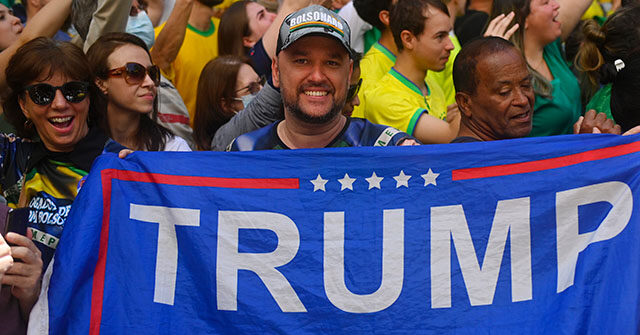In the southeastern Brazilian town of Governador Valadares, local media recently highlighted the emergence of U.S. presidential election billboards featuring former President Donald Trump and Vice President Kamala Harris. Governador Valadares, home to around 257,000 inhabitants, is known for its significant emigration to the United States. Many residents have relocated over the decades, creating deep familial connections across borders, which have earned the town its nickname, “Valadólares,” reflecting the importance of remittances sent home by those living abroad. It’s estimated that over 40,000 residents originally from this town currently reside in the U.S., many of whom began migrating in the 1960s seeking better opportunities.
In a surprising turn, Governador Valadares has become a focal point in the U.S. 2024 presidential election campaign. With less than a week left before Election Day, billboards expressing support for both Trump and Harris have been installed throughout the town. Social media has circulated images of the billboards, one of which features a Portuguese message declaring, “Trump has 99 percent chance to defeat Harris, now he has to defeat the electoral fraud, and that will be the true battle.” This overt expression of political sentiment indicates engagement with the U.S. electoral process, despite being geographically distant from it.
The pro-Harris billboards convey distinct messages in Portuguese, with calls for solidarity against issues such as racism, homophobia, and machismo. One billboard boldly states, “I’m a leftist, I’m a liberal,” showcasing the stark ideological divide among Brazilian expats regarding U.S. politics. Local Minas Gerais radio station Itatiaia reported that there are currently five billboards supporting Trump compared to just one for Harris, showcasing a notable asymmetry in the local political environment.
Itatiaia recently spoke to an anonymous individual responsible for the pro-Harris billboard, who claims that such displays may influence the opinions of voters with connections to Valadares. This individual, who has lived in Boston for two decades, expressed concern about Trump’s policies, categorizing him as a threat to various marginalized groups, including immigrants, women, and the LGBTQIA+ community. This sentiment reflects the ongoing debate over the inclusivity of U.S. politics as perceived from a Brazilian vantage point, highlighting the contrasting political narratives that resonate personally with expats.
The pro-Trump billboards draw parallels to the political climate in Brazil itself, following a precedent established during the 2020 presidential election, when local businessman Edson Delana erected a billboard promoting Trump with slogans reminiscent of former Brazilian President Jair Bolsonaro, emphasizing values like family, faith, and national identity. This continuity reveals how closely entwined the political sentiments in Brazil can be with U.S. electoral events, especially among expatriate communities who often have strong ties to both their homeland and the United States.
According to Brazilian government statistics, approximately 2.1 million Brazilians currently reside in the United States, primarily in urban centers such as New York, Boston, and Miami. This demographic reality reinforces the significance of keeping abreast with U.S. elections, where decisions made in Washington can directly affect the lives of Brazilians both at home and abroad. As the 2024 elections loom, the unexpected emergence of a battleground for U.S. politics in a Brazilian town underscores the profound, yet often overlooked, connections between these two nations shaped by migration, remittances, and shared concerns over social justice and rights.

